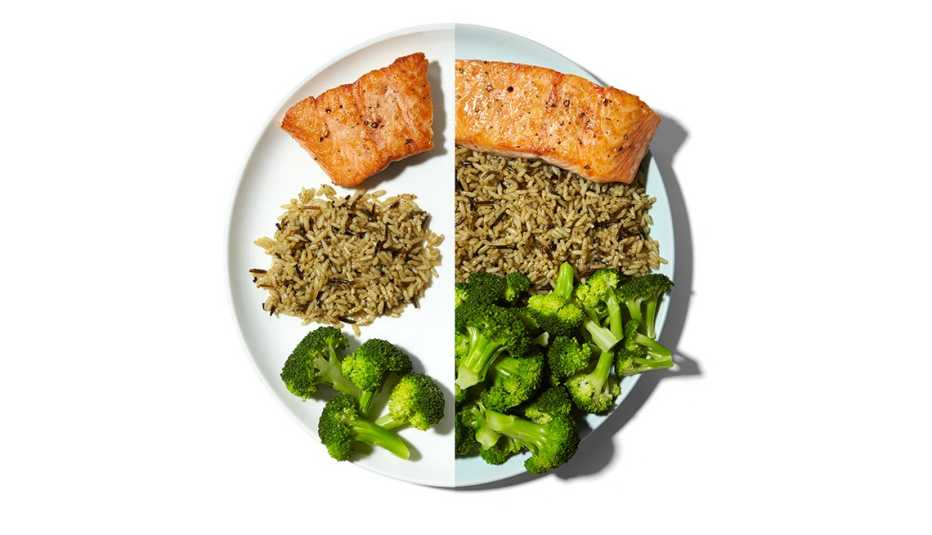AARP Hearing Center
The editors at AARP have filtered through numerous medical journals and studies to identify the best actions you can take to achieve a longer, fuller life. We know there are no guarantees. But genetics account for just 25 percent of a person’s longevity. The rest is up to you. With this collection of some of the most important longevity findings, you’ll have the road map you need to get to 80, 90, 100 or beyond.
1. Frozen is fine
You can eat a balanced diet even when fresh fruits and vegetables are out of season because frozen can be as good as or even better for life-extending nutrients. British scientists found that fresh fruit can lose nutrients after three days of refrigeration, while frozen fruits don’t suffer the same fate. Another study similarly found that frozen blueberries contained more vitamin C than fresh ones.
2. Cut back on pain pills
Regular use of painkillers such as ibuprofen and naproxen — including over-the-counter brands such as Advil, Motrin and Aleve — may raise your risk of heart attack and stroke by 10 percent, according to a 2014 U.S. Food and Drug Administration (FDA) advisory panel review. (Prescription-strength versions may increase your risk by 20 to 50 percent, even after just a few weeks of use.) Reserve these drugs for severe pain, and use the lowest possible dose for the shortest amount of time.
3. Please go to bed
Consistently sleeping less than six hours a night nearly doubles your risk of heart attack and stroke, according to a review of 15 studies published in the European Heart Journal. Another study found that consistently sleep-deprived people were 12 percent more likely to die over the 25-year study period than those who got six to eight hours of sleep a night. These tips from the National Sleep Foundation can help ensure that you get good quality shut-eye, even if you’re among the half of people over 60 who have insomnia:
- Make the room pitch-black dark, and set the thermostat between 60 and 67 degrees.
- Exercise every day. It doesn’t matter what time of day you work out, just so it doesn’t interfere with your rest.
- Stick to a regular sleep schedule, going to bed and getting up at the same time each day.
- Shut down your electronics an hour before retiring, as the light from some devices can stimulate the brain.
- Replace your mattress if it’s more than 10 years old.
4. But don’t always go right to sleep
A Duke University study that followed 252 people for 25 years concluded that frequent sex “was a significant predictor of longevity” for men.
5. Get (or stay) hitched


Marriage truly is good for your health — and your longevity. The prestigious Framingham Offspring Study found that married men had a 46 percent lower risk of death than never-married men, in part due to marriage’s well-known impact on heart health. Indeed, a 2014 study by New York University’s Langone Medical Center found that married men and women had a 5 percent lower risk of cardiovascular disease.
6. Ripeness matters
No, you won’t die from eating under-ripe produce, but new research shows that fully ripened fruit has more life-lengthening health benefits. For example, green bananas are low in fiber and high in astringent tannins that can cause constipation. Fully ripened pears and blackberries have more disease-fighting antioxidants. And in watermelon, a deep red color signifies more lycopene, an antioxidant that may reduce the risk of cancer and heart disease.
7. Don’t sweeten with sugar
A high-sugar diet boosts blood sugar, which in turn plays havoc with your heart by increasing levels of LDL cholesterol while lowering heart-friendly HDL cholesterol, and tripling your risk for fatal cardiovascular disease. The American Heart Association recommends that women consume no more than 6 teaspoons (25 grams) of added sugar a day, and men no more than 9 teaspoons (36 grams).
8. Consider extra vitamin D
Vitamin D, a bright byproduct of sunlight, has many health benefits, including a link to longevity. But too much vitamin D increases your risk of dying as much as too little, according to a 2015 Danish study. So you want to get the right amount. Don’t just rely on outdoor time to get extra vitamin D; the rate of skin cancer rises as we age, so it’s important to limit exposure. The smart plan: Ask your doctor if you would benefit from extra D in pill form. University of Copenhagen researchers found that the ideal vitamin D level is more than 50 nanomoles per liter of blood, but less than 100 nmol/L.
9. Go green


If coffee’s not your thing, green tea also has proven longevity cred, likely because it contains powerful antioxidants known as catechins that may help combat diabetes and heart disease. In a large study of more than 40,000 Japanese men and women, drinking five or more cups of green tea a day was associated with a 12 percent decrease in mortality among men and a 23 percent decrease among women.
10. Vacation … or Else


Not taking time off work might, indeed, be deadly. One study of men at high risk for coronary artery disease found that those who failed to take annual vacations were 32 percent more likely to die of a heart attack. And in the long-running Framingham Heart Study, women who vacationed just once every six years were eight times more likely to develop coronary artery disease or have a heart attack than women who vacationed twice a year.
11. Eat whole grains
The average American eats one serving of whole grains daily — and that may be just a single morning slice of toast. But eating three or more servings each day can cut overall death rate by about 20 percent, according to a 2016 study from Harvard University’s T.H. Chan School of Public Health. Have some oatmeal or brown rice, or get adventurous and go for quinoa, barley, even farro.
12. Spice it up
Eating hot chili peppers may add years to your life. In a 2016 analysis of the dietary habits of more than 16,000 men and women over 23 years, those who reported eating hot peppers reduced their risk of dying by 13 percent. Not a fan of those peppers? Even a little spice can have health benefits. That’s because the body produces endorphins to reduce the heat from the capsaicin in the peppers; those endorphins also reduce pain and inflammation.
13. Drink whole milk
You’ve been told forever to drink low-fat or skim milk, or go for fat-free yogurt. But research published in the journal Circulation in 2016 concluded that those who consumed the most dairy fat had a 50 percent lower risk of developing diabetes, a disease that can shorten your life by eight to 10 years on average.
14. Just add water
Staying adequately hydrated — measured by urine that’s light yellow or straw colored — can also help prolong a healthy life by reducing the risk of bladder and colon cancer and keeping kidneys in tip-top shape. Bonus: It might even help you lose weight. Researchers at the University of Illinois found that those who sipped more H2O ended up eating 68 to 205 fewer calories per day.
15. Say yes to that extra cup
Coffee does more than help you wake up; it also reduces your risk of stroke, diabetes and some cancers. And in a 2015 study published in the journal Circulation, Harvard researchers discovered that “people who drank three to five cups of coffee per day had about a 15 percent lower [risk of premature] mortality compared to people who didn’t drink coffee,” says coauthor Walter Willett, M.D. Mind you, a cup is 8 ounces, so your 16-ounce Starbucks grande is really two cups by that measure.
16. Live like the Amish
A University of Maryland study found that Amish men live longer than typical Caucasian men in the United States, and both Amish men and women have lower rates of hospitalization. What are the Amish ways? Lots of physical activity, less smoking and drinking, and a supportive social structure involving family and community.
17. End the day's eating by 9 p.m.
Not only is eating late bad for your waistline — sleeping doesn’t exactly burn lots of calories — it also increases the risk of heart disease by 55 percent for men ages 45 to 82, according to a Harvard study.
18. Eat your veggies
In a study of 73,000 adults, most in their mid to upper 50s, vegetarians were 12 percent less likely than carnivores to have died from any cause during the six-year study period. The 2016 study, published in JAMA Internal Medicine, found that mortality rates were lowest overall for pesco-vegetarians (those who eat fish occasionally), followed by vegans (those who eat no animal products), and lacto - ovo vegetarians (those who eat dairy and eggs).
19. Eat like the Greeks
The Mediterranean diet, with its reliance on fruits, vegetables, olive oil, fish and nuts, is one of the healthiest diets for both overall health and longevity. Harvard researchers, reporting in the BMJ in 2014, found that those who followed the diet most closely had longer telomeres, which cap the end of each strand of DNA and protect chromosomes from damage. Even those who only sporadically followed the diet reaped longevity benefits, researchers found.
20. Eat less


If you want to reach 100, put down the fork, says Dan Buettner, who studies longevity hot spots around the world, such as Okinawa, Japan. Buettner found that the oldest Okinawans stop eating when they feel 80 percent full. A National Institutes of Health-funded study similarly found that cutting back calories reduced blood pressure, cholesterol and insulin resistance.
21. Drink less (here’s a trick)
More-than-moderate alcohol consumption (generally, more than one drink a day for women or more than two a day for men) leads to a shorter life span . Here’s one way to cut your intake: Pour red wine into a white-wine glass, which is narrower. Studies by Cornell University’s Food and Brand Lab found that people poured 12 percent more into red-wine glasses. You’ll also pour less wine into your glass if it’s sitting on the table, instead of in your hand, says Brian Wansink, the lab’s director.
22. Save your pennies
Money might not make you happier, but it will help you live longer. A 2016 study by Stanford researchers published in JAMA found that people whose income bracket was in the top 1 percent lived nearly 15 years longer than those in the bottom 1 percent. The disparity could be attributed to healthier behaviors in higher-income groups, including less smoking and lower obesity rates, researchers say.
23. Or move to one of these states
If you’re not wealthy, consider moving to California, New York or Vermont, where studies show that low-income people tend to live the longest. Loma Linda, Calif., has the highest longevity thanks to vegetarian Seventh-day Adventists, who live eight to 10 years longer than the rest of us. Nevada, Indiana and Oklahoma have the lowest life expectancy (less than 78 years).









































































